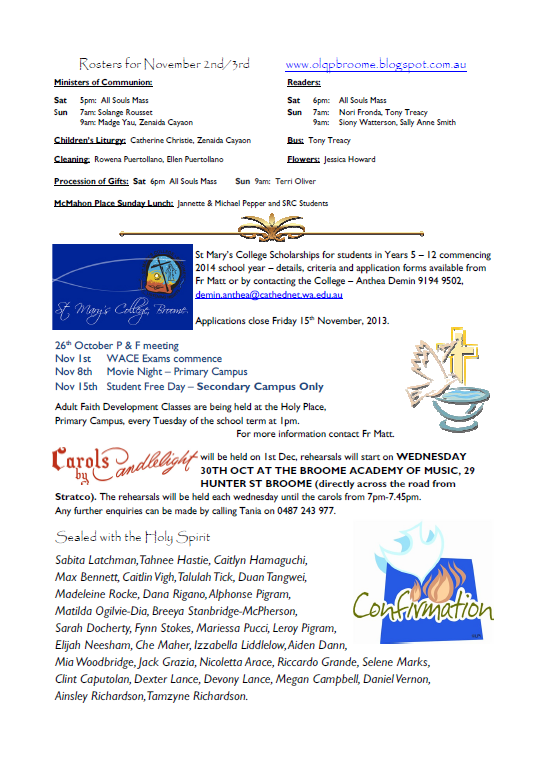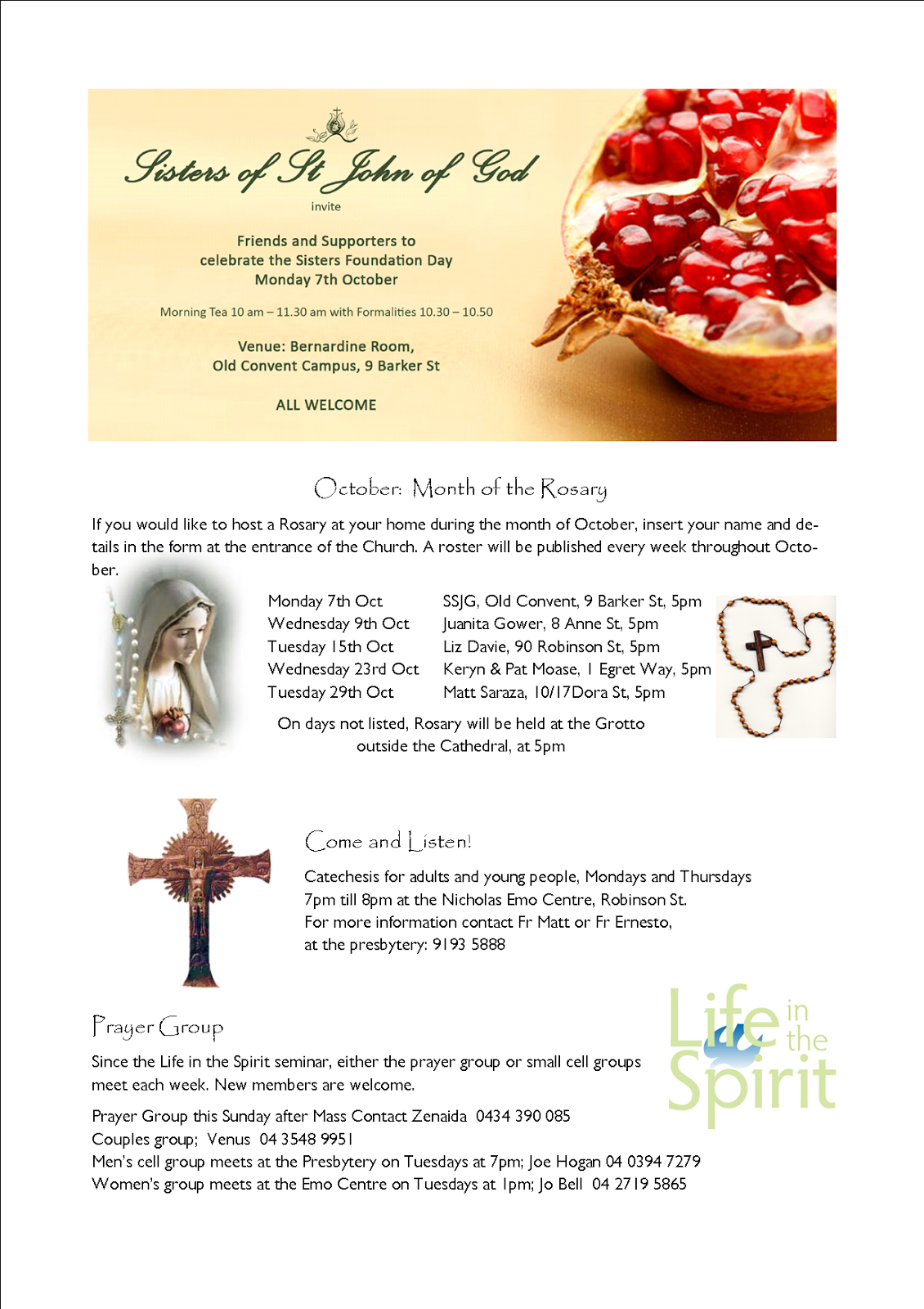Calendar, Bulletin, Rosters, Homilies news and information from the Catholic Cathedral Parish of Our Lady Queen of Peace, Broome, Western Australia. For Mass times this week see the Bulletin below. Enquiries 08 9193 5888
Calendar
Monday, 28 October 2013
Monday, 7 October 2013
Faith is Enough
We often say that one person or another has ‘got the faith’
or, ‘has strong faith’ or even that someone or even a whole country has ‘lost
the faith’. Today we hear the disciples asking Jesus: ‘increase our faith’. So
what do we mean, what is this thing called faith.
Faith is the graced
but free acceptance of God’s self-communication in Christ as mediated by the Christian
community.[i]
God is trying to reach us, whom he has created, and waits for us to respond to
his love. Pope Francis teaches us in his first encyclical letter: “Faith
is born of an encounter with the living God who calls us and reveals his love,
a love which precedes us and upon which we can lean for security and for
building our lives”. Lumen Fidei 4
To have faith is to trust God, in his revealed Word in the scriptures
and the Church. Faith allows us to know that our lives have a purpose, even if
we cannot see that at the moment. Faith allows us to look outside our narrow
range of self-interest and to be able to look on the situation of our world
with the eyes of God, and in doing this, we are able to lift ourselves and
those around us from the morass of fatalism to the life of grace.
Faith allows us to be more, to be authentic and to be
capable of the potential God has given us.
Faith is not about quantity but quality. It doesn’t matter
how much faith we have, because it doesn’t take much to change the world. We don’t
have anything like a mustard seeds worth of faith, yet we still make a
difference. In our Gospel, Jesus asked his disciples to do their duty
faithfully, and then faith will grow. St Paul adds that God’s gift was not one of timidity, but the spirit of power, and love,
and self-control.
Each one of us has at some time or other lamented our lack
or weakness of faith. Jesus speaks to us as well and calls to the same
faithfulness as the disciples. We all have faith to work with, so none of us
are stymied. The famous American social justice advocate Dorothy Day was often
called a saint. Her reaction to this was: Don't
call me a saint. I don't want to be dismissed so easily. It is so easy for
us to say: well that is ok for him, or her, or Dorothy Day or mother Teresa because
they are saints. Well, they are like us, and started with the faith and opportunities
given to them and lived them to the full. As St Irenaeus of Lyon said in 330 The glory of God is man fully alive, in
other words, using all of our gifts to make this world a better place and let
the love of God reign.
We have been given the gift of faith. Our duty is to nurture
and protect that gift as we live it in our lives and pass it one to others.
None are allow dot stick our heads in the sand, to exempt from this wonderful
adventure.
Homily 6 October 2013, 27th Sunday in Ordinary Time Year C, OLQP Broome.
Saturday, 21 September 2013
Tuesday, 17 September 2013
Violence and the Lost Sheep
I am convinced that there is something deep in our psyche that can’t cope with unconditional love. Maybe it is the violence of original sin that has permeated human society ever since God gave us free will and we chose to be destructive. The people of Israel could not cope with a God who was willing to forgive them. If God was pleased, then all was well and he would smite anyone who opposed Israel, and if he was angry, the Israelites copped the brunt of the emotion.
In this black and white world, choices were clear. If you did what God commanded you through the prophets, then you would be protected. As this was taken very literally, it meant that you would have lots of wives and children, be able to feed them and die happily after a very long life whilst watching your enemies being slaughtered if they tried to upset your perfect world. On the other hand, if you chose not to follow the path indicted by the prophets and Mosaic Law, you would be barren, lose fights, starve and if you were lucky, be carted off into slavery rather than be slaughtered. Sounds simple doesn’t it? It was intended to be and is shown clearly in the story of the Golden Calf. Moses, being the front man for the Israelites, negotiated a deal so that God, ‘relented and did not bring upon his people the disaster he had threatened.’
For me, and maybe for you, this is all a bit much. Simple worlds of black and white may sound good in theory to some, but they are just not real. The world of black and white copes well with the Old Testament worldview of a vengeful and angry God who needs appeasing, but cannot cope with love. Jesus came to fulfil the Mosaic Law. St Paul tells us his story of spiritual growth: Mercy was shown to me, he says, because until I became a believer I had been acting in ignorance, and the grace of our Lord filled me with faith and the love that is in Christ Jesus.
It is only in this context that chasing lost sheep makes any sense. Those listening to Jesus didn’t care about those who had wandered away from the pack: If you strayed, then die, simple and clear. But that is not the path of love, not the path of Jesus. Chasing lost sheep does not make sense economically, but it does if we are talking about reflecting the unconditional love of God. The answers to most of the problems in life are not multiple choice!
Recently I was challenged about why we provide meals and support for the homeless at Fr McMahon Place. ‘Those people chose to live that way’ I was told, ‘so let them accept the consequences.’ The same argument can be used for boat people, refugees and people with addictions or on welfare. Proponents like to call it tough love. It makes perfect sense in a violent world ruled by a violent God. It made sense to the Pharisees listening to Jesus, who were genuinely bewildered as to why Jesus does not prefer them, who follow the letter of the law, to those who stray. On the other hand, I was told the other day that the church hated gay people because we hold that marriage is between a man and a woman who are open to life. This violent and judgemental language was from someone purporting to be championing civil rights whilst in effect, refusing to respect the beliefs of others.
Many people on our planet have to live in a violent and harsh world, but it is not God’s world or the world that followers of Jesus are trying to create. We are called be witnesses to the loving mercy of God in this harsh world. We are called to reach out without judging or counting the cost, to help where we can, to include those on the margins. It is not always an easy or comfortable place to be, but it where God works among his people: It is where we are called to be.
Homily 24th Sunday in Ordinary Time Year C 15th September 2013 OLQP
In this black and white world, choices were clear. If you did what God commanded you through the prophets, then you would be protected. As this was taken very literally, it meant that you would have lots of wives and children, be able to feed them and die happily after a very long life whilst watching your enemies being slaughtered if they tried to upset your perfect world. On the other hand, if you chose not to follow the path indicted by the prophets and Mosaic Law, you would be barren, lose fights, starve and if you were lucky, be carted off into slavery rather than be slaughtered. Sounds simple doesn’t it? It was intended to be and is shown clearly in the story of the Golden Calf. Moses, being the front man for the Israelites, negotiated a deal so that God, ‘relented and did not bring upon his people the disaster he had threatened.’
For me, and maybe for you, this is all a bit much. Simple worlds of black and white may sound good in theory to some, but they are just not real. The world of black and white copes well with the Old Testament worldview of a vengeful and angry God who needs appeasing, but cannot cope with love. Jesus came to fulfil the Mosaic Law. St Paul tells us his story of spiritual growth: Mercy was shown to me, he says, because until I became a believer I had been acting in ignorance, and the grace of our Lord filled me with faith and the love that is in Christ Jesus.
It is only in this context that chasing lost sheep makes any sense. Those listening to Jesus didn’t care about those who had wandered away from the pack: If you strayed, then die, simple and clear. But that is not the path of love, not the path of Jesus. Chasing lost sheep does not make sense economically, but it does if we are talking about reflecting the unconditional love of God. The answers to most of the problems in life are not multiple choice!
Recently I was challenged about why we provide meals and support for the homeless at Fr McMahon Place. ‘Those people chose to live that way’ I was told, ‘so let them accept the consequences.’ The same argument can be used for boat people, refugees and people with addictions or on welfare. Proponents like to call it tough love. It makes perfect sense in a violent world ruled by a violent God. It made sense to the Pharisees listening to Jesus, who were genuinely bewildered as to why Jesus does not prefer them, who follow the letter of the law, to those who stray. On the other hand, I was told the other day that the church hated gay people because we hold that marriage is between a man and a woman who are open to life. This violent and judgemental language was from someone purporting to be championing civil rights whilst in effect, refusing to respect the beliefs of others.
Many people on our planet have to live in a violent and harsh world, but it is not God’s world or the world that followers of Jesus are trying to create. We are called be witnesses to the loving mercy of God in this harsh world. We are called to reach out without judging or counting the cost, to help where we can, to include those on the margins. It is not always an easy or comfortable place to be, but it where God works among his people: It is where we are called to be.
Homily 24th Sunday in Ordinary Time Year C 15th September 2013 OLQP
Monday, 9 September 2013
Subscribe to:
Posts (Atom)































